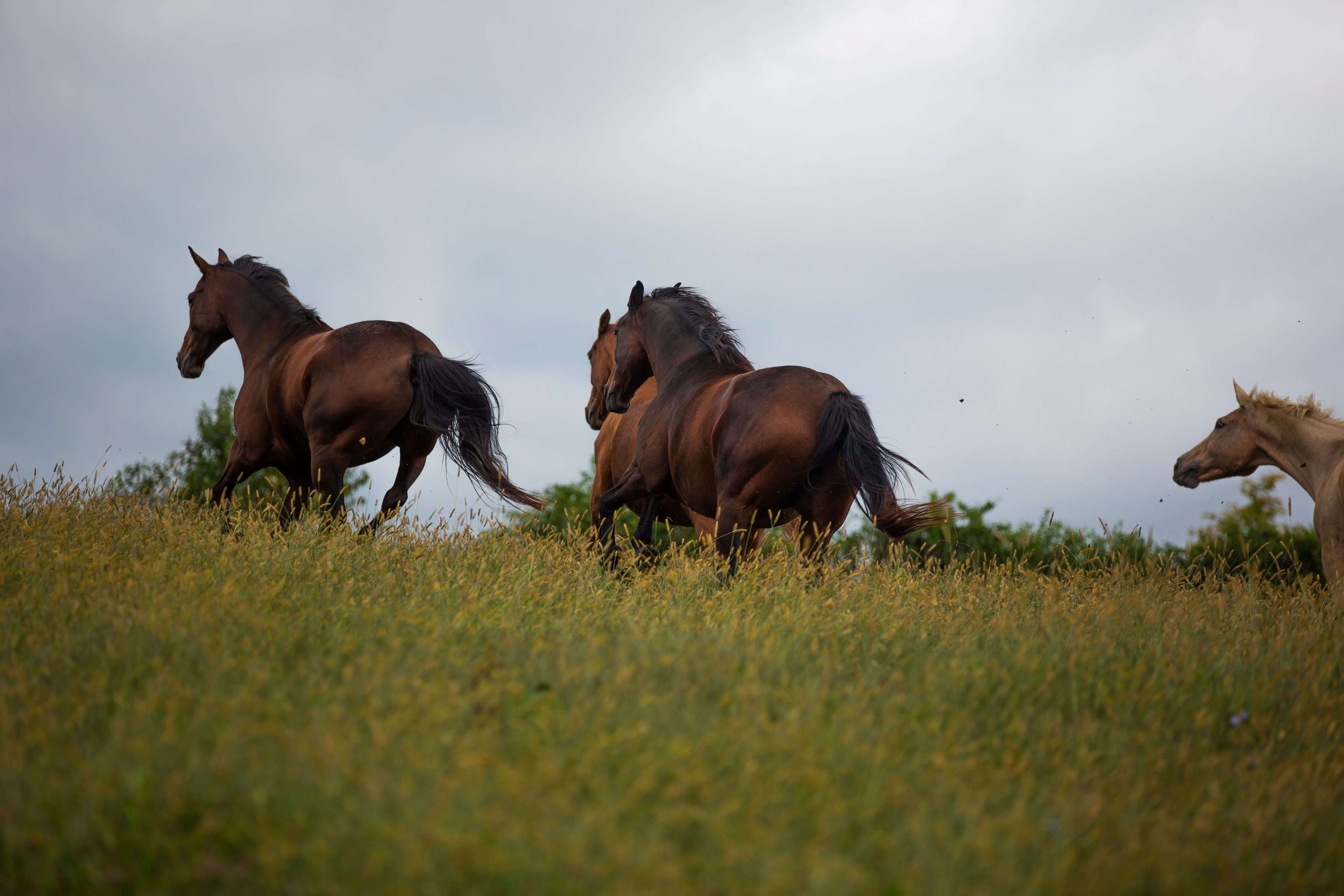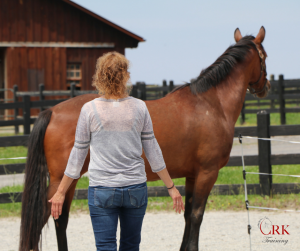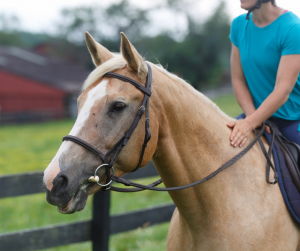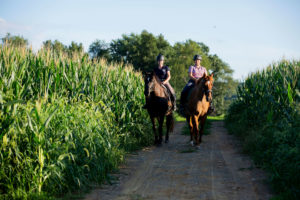Many horses can be called “spooky”, they over-react to harmless things in their environment – a blowing leaf, a flapping bag, a pole that is in a new location, or it may be completely unapparent what they are reacting to at all!
Riding and even just handling these horses can be frustrating, even for an experienced rider, as sudden spooks are a jolt to the nervous system, and when they happen frequently and unpredictably, they become all the more frustrating.
For a new rider, these sudden movements may be a real safety concern as they are developing the fundamental skills of balance for sticking with a horse moving slowly let alone one that is ducking and spinning!
How do we deal with spooking? Can the reactivity that causes it be improved?
In this article, I’m going to suggest four factors of spookiness and how we can work on each one.
The first is the horse’s balance and stability. Second is their personality – the part that is largely determined by genetics and breed. Third is their ability to think and process information about new and novel things. Fourth is their degree and frequency of exposure to those things.
1 – Balance and Stability
The body, or more specifically, the central nervous system, recognizes the critical importance of staying upright. It is part of basic survival instinct.
When the nervous system feels as though it is in constant danger of losing balance and falling it will be more alert and reactive to perceived threats.
A horse that does not have good balance, whose weight is not well distributed over the four feet, allowing muscles to relax, will be more on the alert than one who is able to stand and move securely.
There are many factors that can affect how balanced a horse is, from the health and care of their teeth and feet, to their level of training, and how physically comfortable they are with tack and a rider. Read more here on how posture and movement affect emotion for the horse.
2 – Personality
There is a model of personality called Big 5, widely accepted as a simple yet accurate description of human personality.
The model describes five traits for personality, and since, as humans, we do share many basic structures of our brain with the horse, I believe we can use this model to better understand our horse’s personality.
The fifth trait on this list is Neurosis. Think of this as the degree of sensitivity of an individual. In the case of our horses, sensitivity varies with the individual, but there are certainly breed traits that play a role. The obvious example is that heavy draft breeds tend to be less sensitive than finely built Arabians. Some amount of emotional stability and sensitivity is genetic, unique to the individual, and will limited in how much it changes.
3 – Ability to Think
There is a phenomenon in brain science referred to as “learning to learn”. It means that as an individual learns, they don’t just learn that material or movement, but with repeated learning, they get better at the process itself.
This is true for humans and true for horses as well. In regards to spookiness, we can change a horse’s pattern of thinking in potentially scary situations.
Here is an example of how the thinking pattern can change. If we pair new (and perhaps previously scary) objects such as clippers, tarps, a strategically placed plastic bag, with something positive, such as a food reward for investigating that object, we teach the horse to approach new items with curiosity and positive expectancy instead of fear. The horse learns to make a conscious decision to use the higher regions of his brain to actively investigate the item instead of running off. We expand the connections in the horse’s brain for “investigating new things”.
We may not eliminate the startle response, but we can switch on the processing afterwards.
4 – Amount and Frequency of Exposure
Horses get used to objects or situations they are frequently exposed to.
Park the tractor in a new spot next to your horse’s pasture and he may run and snort the first few days he is turned out, but eventually – if the tractor does not hurt him or scare him – he will get used to it.
We could say that he has habituated to the tractor.
The process in which this happens is called desensitization. Many people connect the term desensitization with the old method of “sacking out”, which typically involved restraining a horse while repeatedly exposing them to whatever it was they were afraid of.
Horses generalize situations differently than people. We can learn quite quickly that a large red ball is a large red ball, regardless of whether it is located in the indoor or the outdoor arena. The horse may not make these generalizations as quickly, but through the learning processed I discussed above, he can adapt to new objects, different situations, and become more confident.
The more that “new” becomes routine for a horse, the less they will react to things new, different, or out of place.
To learn ways to desensitize your horse to new situations in a way that can be enjoyable for both of you, read this article on desensitization.
Spookiness is not always an easy trait to change in a horse, but when you consider these four factors, you can better understand what is causing your horse’s spookiness and how to help him.














37 Responses
Hi Callie
I just wanted to discuss a few topics and share my views. I think horse owners don’t get taught the basics like comforting the horse and praises as I strongly believe that comforting the horse during a spook time goes a long way to build up the confidence in the horse and rider instead of trying to force or demand more pressure on the horse during a spooky time. I have just never saw any YouTube trainer’s really teaching people to comfort their horse’s when they do well during training as they mostly state taking away the pressure is the reward for the horse and maybe the odd scratch of the training stick on their heads but I feel that giving the horse a really good rub and maybe even a treat would encourage the horse to keep up with the good work and would help the horse and rider during a spooky time.Thanks Darryl Bavington p/s I did have other topics but other people might not feel the same as me.
I do try to comfort my horse telling her it’s okay this object won’t hurt her, she listens but it’s after the spook. I don’t want the spook to happen. She spins so quickly I have to ride holding on or I don’t always stay on. I have been riding for years and have a good seat, I have desensitize this horse over and over and she learns at home but on the trail what she learned all goes away when she is spooking at an invented bush monster. I have tried and tried . Sent her for training took lessons. She is now 17 years I’m afraid she will never be that safe mount I want. But I won’t sell her either.
The article about helping a spooky horse was extremely useful. It was helpful to see the discussion of the five different contributing factors, and how to address those that could be altered. Thank you so much for sharing this knowledge.
Callie
I found this video and the article on desensitization very helpful. I have a Percheron-Thoroughbred cross. She has actually spooked at a small stainless steel bowl. She’s a big horse with a lot of power. I fell off her about a month ago. I’m thinking it had more to do with my balance and inexperience. I am working slowly and gently with her. Yesterday she was afraid of a door that had recently been opened in the arena. I’m going to walk her by it today a few times and reward her with some treats. I really love your methods and I believe in compassionate horsemanship.
Hi:
I really enjoy all your articles (senior beginner rider) (therapeutic) – I am terrible rider – but all your articles – especially the ones that the mistake beginners riders make was so good. I made all those mistakes – especially the one about steering. Ryan (the owner and trainer – tells me I am not firm enough).
I love all your articles.
Mary F
I like how you explained the difference between desensitization and habituation. I will try an activity today to improve my horses re activeness and hopefully build curiosity instead of fear by making exposure to something new a pleasant experience. Thank you Callie.
Thank you for this info. I just picked up my new horse yesterday. She’s a 16 year old QH which seems to have a sensible temperment , as I am 65. I have many years of horse experience but am always open to learning new and helpful advice. Love your training articles 🙂
Worked with my 15 year old quarter horse today. Have owned her 15 months and due to an injury was unable to do much work with her until the last 3 months. Our relationship is fluid as one day she is great then the next she is disrespectful in refusing to do anything that is not her choice. Also working on buddy soar due to inability to do much the first 9 months I owned her. Today she was extremly disrespectful and did ground work some riding circles/figure 8 etc. then more ground work. Your spooky video helped as to the learning curve but also to know sticking with the program progress is made. She is also a very inattentive horse and would like directions on how to develop better and consistent attention especially in saddle as this inattention turns into spookiness. Thanks again for all you expert instruction.
TJ
Especially liked the comparisons of how different breeds may be more sensitive than others and, therefore, might be more likely to spook.
Callie, what you offer is good to a point but training isn’t the entire story. As with many training challenges, physical problems should be eliminated first. Your spooky horse could be telling you he is malnourished – not because you are starving him but he might not be getting the right mineral and carbohydrate balance. A good starting point is http://www.calmhealthyhorses.com/index.html
I had a hair-trigger, spooky draft. Nothing seemed to help – not desensitization or habituation. I spent a lot of time – years – trying to “train” that spook out of my horse with no success. My niece told me she was taking magnesium for her anxiety and that it was very helpful. Not having much to lose, I added mag oxide to my horse’s diet and her anxiety turned to curiosity. But she was still hair-trigger. More research (starting with the URL above) indicated she wasn’t getting enough salt and too much potassium and carbohydrate rich grass so I added salt to her daily ration, reduced pasture and added hay. It’s made a huge difference in her composure and she looks terrific at 20 YO.
Great point you brought up here Elisa – another thing to consider is definitely nutrition! Thank you for sharing this with the community here at CRK Training.
-Julia Burdy, CRK Training Community Manager
So I followed the concept of allowing the horses natural curiosity to override his fear today. I brought Hank, my horse to a set of logs laid down with a discarded pool liner between them. We approached the scene, he looked with at it and said “That wasn’t there before, what the heck” so I had him just walk around it. We approached it again. I stopped and he looked and I petted him, he looked again and we walked on around it. The next time we stopped he put his head down to graze so I knew he was now relaxed next to it. That was my que to go on and try to walk him over the logs and the liner between them, which he did. I petted him and ended our time positively. We were both winners today.
Thanks for sharing this great story Sue, it sounds like you and Hank handled it well!
-Julia Burdy, CRK Training Community Manager
I have a warmblood that is on the spooky side. After 4 years of ups and downs, I have learned that we are quite similar in our reactivity…my coach helped me realize that at times, I spook as much as my horse.
Loved this ! Thank you ! It was very helpful . This coming LaborDay weekend, I will be taking a Despooking Clinic by Bill Richey of the mounted police . Will be uso g my lesson horse or hopefully by then I will have my own. I’m sure it will be a learning experience as well.
Sally, that sounds like it is going to be a very interested event to attend – those police horses definitely have to be quiet and unbothered by things in their environment!
– Julia Burdy, CRK Training Community Manager
As always, here’s another insightful and well explained article. I particularly liked the point about making exposure to new things a positive experience and the idea of advancing the way the horse mentally approaches/processes new stimuli. Thanks Callie.
Happy to hear you enjoyed this article Dawn!
-Julia Burdy, CRK Training Community Manager
It was an informative and interesting video. I was also taught that some spookiness can also come from rider being tense or nervous which is transmitted to the horse. Since horses are so sensitive and intuitive they pick up on our anxiety …they look to us to help them feel confident. Sometimes we have to de-spook the rider as well:)
Great article! It’s really helpful to know how sensitive your horse is and how he reacts to strange things. I found that my highly sensitive lease horse takes in a very sharp breath just before a spook – I can feel his ribs bump into my calves. If I distract him when he takes that breath, he doesn’t spook and will go calmly past the dragon. But, I found that he needs more than just a physical cue to break his focus on the dragon. So I combine it with singing a bit to him, which makes him pay attention to physical and audio cues and helps me breathe. (Our favorite is the Kenny Chesney “Everything’s gonna be all right :))
Appreciate this video and article. Recently moved to a new barn and my horse has been very reactive to the point where, at my age, I can’t enjoy riding. Your teaching sessions are very helpful and make very logical sense! Hoping for progress!!!
I had a bad experience 2 days ago when my horse spooked on the trail and took off like a shot. Could not get him under control and I fell. Once I recover from my injuries how should I approach my trail riding? I plan to do a lot of ground work during my healing but what else should I be doing to get back in the saddle?
Elizabeth, it is a little hard to comment on what you should do because I don’t know the full situation of why the horse spooked or what your injuries were. Unfortunately, even the most well-behaved horses spook and the best riders fall! I would recommend definitely taking a look at our free resource center with tips and advice for dealing with fear and anxiety, you can access that free resource site by clicking here.
-Julia Burdy, CRK Training Community Manager
Thank you for this! Thank you for breaking down spookiness. In my work with ‘spooky’ horses I have had to come up with a way to think about spookiness/reactiveness, so I have chosen to relate equine spookiness to my understanding of arousal in cats. In that way of thinking arousal is a continuum that ranges between dead asleep and a fight or flight response. At any one moment the horse is somewhere on that continuum, as is the person. I see my job in working with horses, and their people, is to get them, and keep them, at a place in that continuum where learning, and trusting, can take place.
I’ve started riding a pony coming back into work from a leg injury. We are only mostly walking under saddle in the arena at the moment, however she feels tense in walk and when we trot her a little. She lifts her head and feels anxious. She also spooks in the arena at nothing. She’s completely fine out on small hacks, so much more relaxed and never spooky.
When she spooks, she normally just skips to the side. What should I’d do when she spooks? normally I just sit deep and gently pat/rub her neck and tell her it’s okay, but if she gets scared more and starts lifting her head I pull my reins down to stop her rearing. Is there anything else I can do to help her relax in the school and what to do if she spooks?
I would be careful patting and petting after a spook – any type of ‘reward’ might be counter productive if she does that. So she only really is spooking like this in the arena? Is there a certain corner of the arena where it gets worse? Has she always had this behavior?
-Julia Burdy, CRK Training Community Manager
I have just picked up a horse who seems to be very reactive to changes. I have watched your blogs on spooky and desensitising. I have had the horse 2 days and we had a nightmare turning out. He was quite dangerous. I am going to work over the next few months watching your blogs etc and will keep a diary of progress. I am so glad I found your blogs.
Thanks Lesley
Lesley, I’m glad you found our blogs too! If you’ve only had him two days I would recommend giving him so time to adjust…do you have a history on him?
-Julia Burdy, CRK Training Community Manager
Callie I just want to say that you were born to teach! You speak clearly and succinctly and straight to the point. Thank you for sharing your knowledge.
Like your simple clear explanations… been riding a very long time and still great to review basics..
Irene, I’m glad to hear you enjoyed this video! 🙂
-Julia, CRK Training Community Manager
My horse is recently alone since his friend went with another owner. We all know horses are happier and safer living in herds or at least with other horse. My question is “Is loneliness one reason to make my horse spookier since the moment he tries to be alert?”
Thank you very much for your videos and your explanations Callie!! They are helping me a lot.
I feel so lucky to have found you out on the web!! :))
Hi Nuria, it can overall increase the stress of the horse so inturn could have that effect.
-Julia Burdy, CRK Training Community Manager
Loved your talk on spooking horses & your work with Marlene., the skittish mustang. I own an older Quarter Horse mare ( a freebie) & it’s been interesting getting to know her. She’s fairly well trained & mostly quiet, sweet. However, we’ve experienced more than one serious spook, resulting in a free trip to the ground for me. Here’s what I’ve figured out about her: she’s well trained enough that if I maintain control & push her forward with leg & voice—it’s usually enough to carry on. It’s almost as if—if I don’t join in the potential drama—there is no drama. Granted, there are real fears occasionally. Helium balloons! I tied a few to the fence line & fed her nearby for days. Brought her carrots so that she had to walk right up to the balloon to get them. I did this a few months apart & it’s all good. I’m very untrained (professionally) but I have figured out a few things over the years. I loved how you realized Marlene could adjust to normal movement around her. It’s always good to focus on what you’re going to accomplish, rather than what the horse might do. Horses recognize confidence. I’m happy to discover your website & look forward to learning more! Thank you !
Glad to have you here Margie and that you enjoyed the video! 🙂
-Julia, CRK Training Community Manager
Love the balloons
During a trail ride someone had tied balloons to stone pillars. Our horses were on high alert. My choc lab walked over to try & get a balloon!
Well the horses decided that if that dog wasn’t afraid, then neither were they! LOL
My ex race horse was scared of nature!
I used laughter, the first time he skid for doves. I almost fell off I was laughing so hard.
Like you said your attitude dictates the end result.
We were riding horses fresh off the track. We were on the road heading towards the trail. The owner saw the school bus her nervousness caused he horse to spin. I was looking backwards 1 hand on the reins the other on the horses rump talking to the lady. The bus went by us no problem.